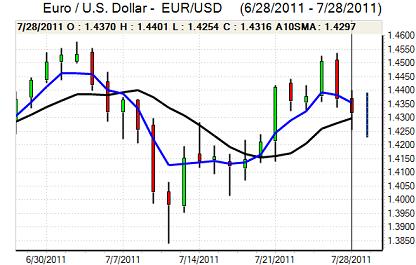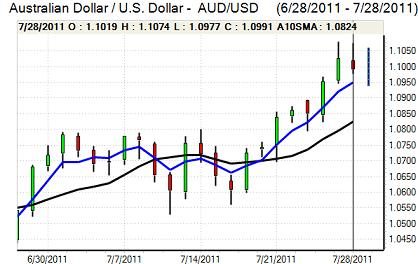EUR/USD
The Euro hit resistance close to 1.44 against the dollar in European trading on Thursday and then retreated sharply with lows close to 1.4250.
There were renewed tensions surrounding Euro-zone peripheral bond markets with Italian and Spanish yields rising sharply during the day. Weak demand pushed Italian yields to an 11-year high which increased the fear of contagion and had a negative impact on the Euro. There were also further doubts over political commitment to an increase in EFSF funding, especially in Germany and there was further evidence of stress within the banking sector.
The US economic data was stronger than expected with jobless claims falling to 398,000 in the latest week from 422,000 previously while there was a 2.4% increase in pending home sales. The impact was over-shadowed by congressional inability to secure a debt agreement.
After tortuous hours of negotiations between Republican members, the scheduled House of Representatives vote on its debt-ceiling bill was postponed and then finally cancelled as the leadership did not have the votes to pass the legislation. Market anxiety inevitably increased sharply following the vote cancellation as there would be no real possibility of any agreement being reached ahead of the weekend, especially as the Senate has already pledged to reject the House bill.
There will be increased fears that the US could default and contingency planning will be watched very closely during Friday. The net impact was to weaken the dollar, although clear direction was lacking as players looked for defensive plays. The Euro initially moved back to near the 1.4350 area before weakening again as Moody’s put Spain’s credit rating on review for a possible downgrade.

Source: VantagePoint Intermarket Analysis Software
Call now and you will be provided with FREE recent forecasts
that are up to 86% accurate * 800-732-5407
If you would rather have the recent forecasts sent to you, please go here
Yen
The dollar was unable to make any impression on the yen during Thursday and was subjected to renewed selling pressure in Asian trading on Friday as the yen gained from weak risk appetite. There was also further speculation over a decline in speculative short yen positioning as the lower Japanese margin requirements come into effect next week. The dollar dipped to test fresh 4-month lows below 77.50 against the yen on Friday as US deadlock persisted.
There was an improvement in July’s PMI manufacturing index, but the industrial production and household spending figures were both below expectations which dampened expectations over the pace of Japan’s economic recovery.
There were further verbal warnings over the yen’s level from Finance Ministry officials, but there was no evidence of intervention with speculation that there would be no action until the US debt situation had been resolved.
Sterling
Sterling was subjected to choppy trading conditions during Thursday and found support below 1.63 against the dollar with a rally back to highs near 1.6380. The Euro dipped to lows just below 0.8750 against the UK currency.
The latest consumer confidence index recorded a further decline to -30 for July from -26 previously which was a fresh two-year low and maintained fears over the economic outlook, especially as there was a downbeat CBI retail survey as well as sales expectations declined to a 12-month low. The Nationwide did report a 0.2% monthly increase in house prices for July which stabilised sentiment to some extent.
International considerations remained extremely important and, despite unease over the economic outlook, Sterling did appear to be receiving some defensive support as risk appetite deteriorated. There was a decline in UK benchmark bond yields as US yields moved higher. Sentiment could still prove to be very fragile if there is further evidence of a fresh UK downturn.
Swiss franc
The dollar again found some support below 0.80 against the franc with some further reports that option-related positions below this level were being defended. The US currency was still unable to make any headway as the franc maintained a strong tone on the crosses. The Euro retreated to lows below 1.1450 before finding some temporary respite.
Safe-haven considerations will continue to dominate in the short term and there will be further demand for the franc is there is no US debt deal over the weekend. There will also be an underlying lack of confidence in the Euro-zone outlook which will maintain defensive franc demand.
Source: VantagePoint Intermarket Analysis Software
Call now and you will be provided with FREE recent forecasts
that are up to 86% accurate * 800-732-5407
If you would rather have the recent forecasts sent to you, please go here
Australian dollar
The Australian dollar rallied back to highs just above 1.1070 against the US dollar on Thursday, but was unable to sustain the advance and weakened back to below 1.10 in local trading on Friday. The US debt impasse undermined confidence in the US currency, but also triggered a deterioration in risk appetite which curbed Australian dollar demand. There were also fresh doubts surrounding the Asian and global growth outlooks.
Domestically, there was a 0.1% decline in private-sector credit for June which maintained expectations of slower economic growth. Tensions will tend to increase ahead of next week’s very important Reserve Bank interest rate decision.




